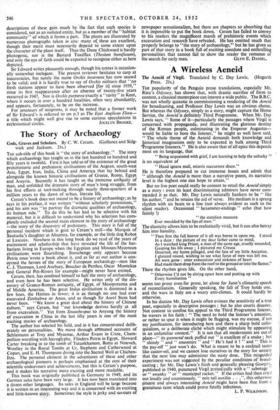A Wireless Aeneid
The Aeneid of Virgil. Translated by C. Day Lewis. (Hogarth Press. 21s.) THE popularity of the Penguin prose translations, especially Mr. Rieu's Odyssey, has shown that, with drastic sacrifice of form to , content, a classical masterpiece can interest a wide public. The B.B.C. was not wholly quixotic in commissioning a rendering of the Aeneid for broadcasting, and Professor Day Lewis was an obvious choice. But whereas the Odyssey, simply as a story, might capture the Home Service, the Aeneid is definitely Third Programme. When Mr. Day Lewis says, " Some of it--iiarticularly the passages where Virgil is concerned with propaganda; and illustrating the glorious destiny of the Roman people, culminating in the Emperor Augustus— would be liable to bore the listener," he might as well have said, " The whole theme of the Aeneid demands both knowledge and historical imagination only to be expected in bulk among Third 'Programme listeners." He is also aware that of all epics this depends most on its language, that " Being acquainted with grief, I am learning to help the unlucky '! is no equivalent of " Haud ignara mali, miseris succurrere disco."
He is therefore prepared to cut immense losses and admit that " although the Aeneid is more than a narrative poem, its narrative level is the highest one can hope to attain."
But no live poet could really be content to retail the Aeneid simply as a story : even its least discriminating admirers have never com- mended it as that. Mr. Day Lewis naturally hankers to be " like his author," and he retains the aid of verse. His medium is a sprung rhythm with six beats to a line (not always evident as such to the silent reader). Occasional " hexameter-endings " echo (but how faintly !) " the stateliest measure
Ever moulded by the lips of man."
The elasticity allows him to be realistically vivid, but it can also betray him into banality.
" Then first the full horror of it all was borne in upon me. I stood
In a daze : the picture of my dear father came to mind, As I watched king Priam, a man of the same age, cruelly wounded, Gasping his life away ; I pictured my Creusa Deserted, my home pillaged, and the fate of my- little Ascanius. I glanced round, wishing to see what force of men was left me.
All were gone : utter exhaustion and sickness of heart Had made them drop from the roof to the groupd or into the flames."
There the rhythm gives life. On the other hand,
" Otherwise I'd not be sitting apart here and putting up with Every humiliation " seems too prosy even for prose, let alone for Juno's climactic speech of reconciliation. Generally speaking, the fall of Troy holds one, and the wars in Italy are a weary anti-climax. It could hardly be otherwise.
In his diction Mr. Day Lewis often evinces the sensitivity of a true poet, especially in descriptive passages ; but he also courts disaster. Not content to confine his appeal to the Third Programme listener, he wavers in his faith : " The need to hold the listener's attention, or rather to spur it when it might be flagging, was my excuse, if not my justification, for introducing here and there a sharp bold collo- quialism, or a deliberate cliché which might stimulate by appearing in an unfamiliar context." It is not that all modernisms are out of place—" its gunmetal neck puffed out " is excellent of a snake ; but " shindy " and " souvenirs " and " He's had it ! " and " This is the pay-off " just won't do. Whit is meant to be a cocktail tastes like castor-oil, and we cannot lose ourselves in the story for anxiety that the next line may administer the nasty dose. This misguided experiment was not suggested by the peculiar conditions of broad- casting ; for Mr. Day Lewis's fresh and generally pleasing Georgics, published in 1940, punctured Virgil priodlcally with a " sabotage " or " swanky " or " municipal racket." If the critics had then cried out loudly and unanimously, " non tali auxilio . . ." this otherwise ,sincere and always interesting Aeneid might have been free from a gratuitous taint which could proye fatally infectious.
L. P. WiLKINSON.


































 Previous page
Previous page